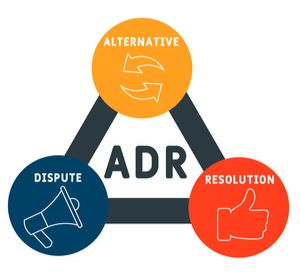Blog
Alternative Dispute Resolution: A Different Path to Conflict Resolution
COVID-19 has changed virtually every aspect of our lives, including access to the court system. Court dockets have ground to a halt, there are no jury trials for the foreseeable future, and your right to confront a witness is often confined to a video conference. Did you know there are alternative means of resolving disputes that are equally effective, currently accessible, and less expensive? Where you can choose who hears your claims and considers the evidence, and have input on how your own claims get resolved?
Alternative Dispute Resolution or “ADR” has existed inside and outside of our judicial system for decades. The most common ADR procedures are arbitration and mediation. While these two terms are often used by non-lawyers interchangeably, they are, in fact, very different in both their procedures and substance. Arbitration involves the use of one or more neutral parties, usually agreed to by the disputing parties, who hear evidence and issue a binding decision. Mediation is non-binding, but also involves the use of third-party neutral(s) that help the disputing parties negotiate a mutually agreeable resolution. Mediation and arbitration are typically creatures of statute or contract; that is, in most instances the parties are either obligated by existing law or have agreed in a previous contract to submit all disputes to ADR.
There are a variety of state and federal statutes mandating the arbitration of particular matters. For example, securities claims and certain labor disputes must be arbitrated. However, the vast majority of cases that are mediated or arbitrated today arise out of contractual agreements. There is an ever-growing movement in corporate documents, basic consumer contracts, and insurance policies to require pre-suit mediation followed, if necessary, by binding arbitration.
Whether compelled by statute or contract to ADR, arbitration procedures follow the same basic route: there is typically a written complaint or demand followed by an answer, a formalized exchange of information, the appointment of an arbitrator, the conduct of an administrative or preliminary hearing to identify the issues and the appropriateness of any interim measures to protect the parties during the pending cases, and an evidentiary hearing before the third party neutral. Once an award has been rendered, our state statutes, as well as comparable provisions in federal law, have enforcement mechanisms in the event the non-prevailing party chooses not to respect the ultimate ruling.
There are many benefits to the arbitration process. Generally ADR costs less and moves more quickly through court proceedings; parties may participate in the structure of the process, including the selection of the mediator or arbitrator; and matters discussed are kept in strict confidence. However, in recent years, many lawyers (including those here at KKC) have noticed an increase in arbitration delays and costs. Arbitrators currently have growing parallels to the traditional litigation processes of exhaustive discovery and depositions, wasteful motion practice, and challenges to every conceivable aspect of the arbitration proceedings, including the arbitrator’s appointment, their authority, and award. A variety of alternative dispute resolution providers are working feverishly with lawyers that actively arbitrate cases to redress these legitimate concerns.
With arbitration increasing in complexity, more disputing parties are favoring mediation. Mediation is also being employed by our state and federal court system in virtually all matters. In state court, the parties can mutually agree in a pending case to a court-annexed mediation using the services of an existing judge or other agreed-upon attorney trial referee/fact finder. Our legislature has made mediation a requirement in pending appeals, certain zoning matters, and in all divorce cases. Again, the benefits of mediation are numerous: the ability to hand select a mediator with experience in the subject matter of the dispute, free reign of the parties to structure a mediation that is suitable for their needs, and reduced costs. Detractors would say that mediation is often forced upon the parties before they are adequately prepared to form concrete positions on the issues and can result in further entrenching the parties into polar opposite positions.
It has been our experience that parties who voluntarily agree to attempt dispute resolution short of litigation can find ways to circumvent these potential road blocks. Often this process is most efficiently guided by a skilled and experienced neutral who can identify real issues from those that simply grind a party’s gears. There are a plethora of organizations that specialize in mediation and employ trained specialists with the legal experience and conflict resolution training to steer virtually any problem through to a successful resolution.
This is not to say that all matters are well-suited to ADR. There may be circumstances where a client needs to avail themselves of the judicial system’s power (to obtain an injunction, for example). However, as court houses become increasingly crowded and the resources available to process lawsuits dwindle, there will be increased external pressure to choose ADR. There will likely be even more legislation that mandates ADR. We have already seen this occur in residential foreclosures when, after the recession of 2008, court houses were flooded with claims emanating from defaulting loans with no efficient means of managing the huge influx of cases. Accordingly, the foreclosure mediation program was born, and was a statistical success in reducing homes lost through foreclosure.
KKC’s Litigation Department knows how to effectively utilize ADR to get our clients prompt and efficient justice at a fair price. Our lawyers have mediated and arbitrated through a variety of ADR service providers and know their rules. Our Litigation Department Head, Michael Kopsick, has been a court-appointed mediator, fact finder, and arbitrator for over two decades, and has been appointed by several private ADR services as the sole arbitrator on dozens of matters.
Your time and security are now more valuable than ever. Learn about your options and consider a different path from the uncharted waters surrounding our court system. For more information or to set up an appointment, contact our Litigation Paralegal, Tracey Toney, at 860-812-1747 or ttoney@kkc-law.com.
